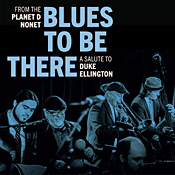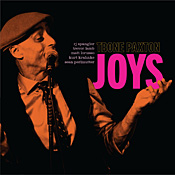Planet D Nonet’s Impressions of the Duke;
John Tbone Paxton’s Joys
For fifteen years the Planet D Nonet, co-led by James O’Donnell and RJ Spangler, has been celebrating the rich variety of jazz, unencumbered by stylistic restrictions, traveling the musical spaceways from Buddy Johnson to Thelonious Monk, from Cape Town to Kansas City, from Louis Jordan to Sun Ra, combining reverential salute with their own brand of swing. It was inevitable that they would eventually have to tackle the majesty of Duke Ellington, and the time has come as they have just released Blues to Be There: A Salute to Duke Ellington with Alex Colista, alto & soprano saxophones; Christopher Tabaczynski, tenor saxophone, clarinet; Goode Wyche III, baritone saxophone, clarinet; James O’Donnell, trumpet, co-leader, vocals; Charlie Miller, trumpet & flugelhorn; John Tbone Paxton, trombone, vocals; Michael Zaporski, piano & background vocals; Trevor Lamb, bass; Sean Perlmutter, drums; and RJ Spangler, congas, bandleader and background vocals; with special guests Alex Harding, baritone saxophone; Ryan Bills, tenor saxophone; and Kasan Belgrave, clarinet.
Tributes to the Duke most often concentrate on his best-known warhorses, the tunes that he himself often featured in the “dreaded medley” that was a feature of his concerts (cleverly accruing ASCAP composition income). Instead, the Nonet has set its focus on the later part of Ellington’s long career, tackling sixteen compositions from the late fifties onwards, taken mainly from the LPs Spacemen, Blues in Orbit, Afro-Bossa, and the soundtrack from the movie Anatomy of a Murder, with an additional few compositions from other releases. Throughout, the solos and arrangements preserved a good balance between imitation and originality, all aimed at reprising the spirit of Duke’s late masterpieces. The band was inimitable, and this recital succeeds so well in contrast to various attempts at reproducing precisely its sound, which always fall flat and are of questionable taste.
The opening track, the title tune of the Spacemen recital, is an apt opening, as this session was performed by a nonet. This was originally a feature for Clark Terry’s flugelhorn, but here the whole band takes solos, beginning with O’Donnell and ending with bass and drums, providing a nice intro to the prodigious solo talents of all involved. The only well-known tune, “Take the A Train,” is also taken from the Spacemen album version, with O’Donnell doing a remarkable take on Terry’s vocalizing (with his own interpretation of a feature usually handled by Ray Nance). Paxton sings on “Moon Maiden,” reprising a rare vocal outing by the maestro that was prepared for a live TV broadcast as everyone waited for the transmission of the Apollo 11 landing on the moon in 1969.
The arrangements, as is usual with Planet D, are cleverly crafted to reflect the atmosphere of the originals without always reprising them precisely, often giving the impression of a bigger band at play. For example, on “Chinoiserie,” Chris Tabaczynski is ably tasked with providing his take on Harold Ashby’s tenor sax solo, while the whole group remarkably manages to sound like a whole big band. The Afro-Bossa tunes (“Tigress,” “Purple Gazelle,” “Bonga,” and “Moonbow”), with their complex rhythms, are particularly well suited to the percussion talents of the Nonet. The final track, the traditional combination of “V.I.P. Boogie” and “Jam with Sam,” that originally featured an array of soloists that Duke referred to as “name calling,” is abbreviated here: it begins with Wyche’s mighty baritone sax, some fabulous soprano sax from Colista, Bills on tenor, Paxton now on trombone, Zaporski’s piano, all ending up with O’Donnell’s exuberant virtuosic trumpet in place of the inimitable stratospheric explosions of Cat Anderson, wisely ending up on a nice middle range note in place of Cat’s whistling high note, a nice aesthetic touch but also apposite for sanity and good health.
Many of the same musicians appear on various tracks of John Tbone Paxton’s album Joys, likewise released on Eastlawn Records. This recording is built around his vocal talents, although his expressive trombone playing is equally featured throughout. The tune selection is eclectic so as to accentuate Paxton’s versatility acquired through many a year of continuous gigging in Detroit and surrounding areas. Paxton is a wonderful vocalist, with a slightly raspy voice, who croons like an instrumentalist but pays much attention to the lyrics, and his trombone playing is equally accomplished.
The opening “Millenberg Joys” was written by Jelly Roll Morton and members of the New Orleans Rhythm Kings and first set down on a recording by the composers in 1923, but you would never guess that listening to Paxton’s laid-back rhythm-and-blues version with a strong foot-tapping modern beat. He gets down ever more for a slow version of “Sweet and Low,” made famous by Fats Waller, complete with plunger outing. The repertoire ranges from the ballad “This Will Make You Laugh,” first recorded ages ago by Nat King Cole, here done with simulated strings and a lovely trombone solo, to romps such as “Lulu’s Back in Town,” another Waller favorite, but also features a slow bossa nova and swing era gems.
The only tune without a vocal is Neal Cresque’s soul jazz “Cease the Bombing” that ends the CD. This is a well-planned recital of great tunes sung and played with gusto and excitement by Paxton, but it also owes its success to the exquisite accompaniment by a core small group consisting of guitarist Matt LaRusso, bassists Kurt Krahnke and Trevor Lamb, drummer Sean Perlmutter, and percussionist RJ Spangler. Russo, in particular, should be singled out for his strong accompaniment, arrangements, and solos as most tracks are without a pianist. Various tracks also include backgrounds and some hot solos by members of the Planet D Nonet: Alex Colista, Goode Wyche III, James O’Donnell, Christopher Tabaczynski, Michael Zaporski, as well as a few guests: trumpeter John Douglas and keyboardist Mike Harrison.

